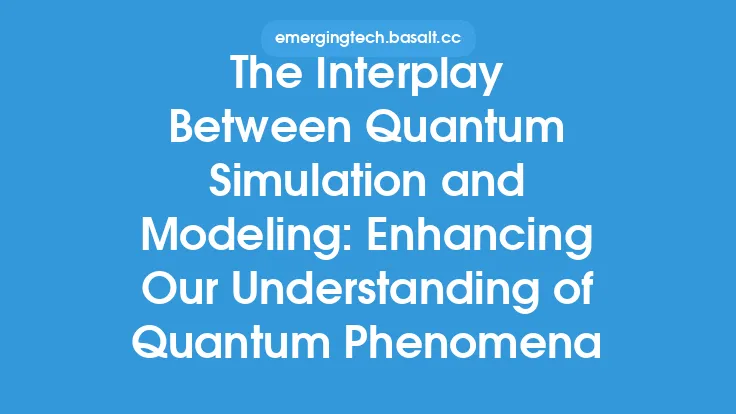Quantum simulation is a crucial aspect of quantum computing, as it enables researchers to study and analyze complex quantum systems in a controlled and efficient manner. At its core, quantum simulation involves the use of a quantum system to mimic the behavior of another quantum system, allowing for the exploration of quantum phenomena that are difficult or impossible to study using classical computers. This technique has far-reaching implications for various fields, including chemistry, materials science, and optimization problems.
Introduction to Quantum Simulation
Quantum simulation can be broadly categorized into two types: analog and digital. Analog quantum simulation involves the use of a quantum system to directly mimic the behavior of another quantum system, without the need for explicit programming or control. This approach is often used to study quantum many-body systems, where the interactions between particles are complex and difficult to model using classical computers. Digital quantum simulation, on the other hand, involves the use of a quantum computer to simulate the behavior of a quantum system, using a series of quantum gates and operations to mimic the desired dynamics.
Quantum Simulation Techniques
Several techniques are used in quantum simulation, including quantum circuit learning, variational quantum eigensolver (VQE), and quantum approximate optimization algorithm (QAOA). Quantum circuit learning involves the use of machine learning algorithms to learn the optimal quantum circuit for simulating a given quantum system. VQE is a hybrid quantum-classical algorithm that uses a classical optimizer to minimize the energy of a quantum system, while QAOA is a quantum algorithm that uses a combination of quantum and classical operations to find the optimal solution to a given problem.
Applications of Quantum Simulation
Quantum simulation has a wide range of applications, including the study of chemical reactions, the behavior of materials at the atomic level, and the optimization of complex systems. In chemistry, quantum simulation can be used to study the behavior of molecules and chemical reactions, allowing for the design of new materials and drugs. In materials science, quantum simulation can be used to study the behavior of materials at the atomic level, enabling the design of new materials with unique properties. Optimization problems, such as the traveling salesman problem, can also be solved using quantum simulation, allowing for the efficient solution of complex problems that are difficult or impossible to solve using classical computers.
Challenges and Limitations
Despite the potential of quantum simulation, there are several challenges and limitations that must be addressed. One of the main challenges is the need for high-fidelity quantum control, which is essential for accurate and reliable quantum simulation. Noise and error correction are also major concerns, as they can quickly accumulate and destroy the fragile quantum states required for simulation. Additionally, the development of practical quantum algorithms and software for quantum simulation is an active area of research, and significant progress is needed to make quantum simulation a practical tool for scientists and engineers.
Quantum Simulation Hardware
The development of quantum simulation hardware is a critical aspect of advancing the field. Several types of quantum hardware are being developed, including superconducting qubits, ion traps, and topological quantum computers. Superconducting qubits are one of the most widely used types of quantum hardware, and are being developed by companies such as Google, IBM, and Rigetti Computing. Ion traps are another type of quantum hardware, which use electromagnetic fields to trap and manipulate ions. Topological quantum computers are a new type of quantum hardware that uses exotic materials called topological insulators to create robust and fault-tolerant quantum states.
Future Directions
The future of quantum simulation is exciting and rapidly evolving. As quantum hardware and software continue to advance, we can expect to see significant improvements in the accuracy and efficiency of quantum simulation. The development of new quantum algorithms and techniques, such as quantum machine learning and quantum reinforcement learning, will also play a critical role in advancing the field. Additionally, the integration of quantum simulation with other fields, such as materials science and chemistry, will enable the solution of complex problems that are currently unsolvable using classical computers.
Conclusion
In conclusion, quantum simulation is a powerful tool for studying complex quantum systems, and has the potential to revolutionize fields such as chemistry, materials science, and optimization problems. While there are several challenges and limitations that must be addressed, the development of quantum simulation hardware and software is rapidly advancing, and we can expect to see significant improvements in the accuracy and efficiency of quantum simulation in the coming years. As researchers and scientists, it is essential to continue advancing the field of quantum simulation, and to explore new applications and techniques for using this powerful tool to solve complex problems and advance our understanding of the quantum world.





